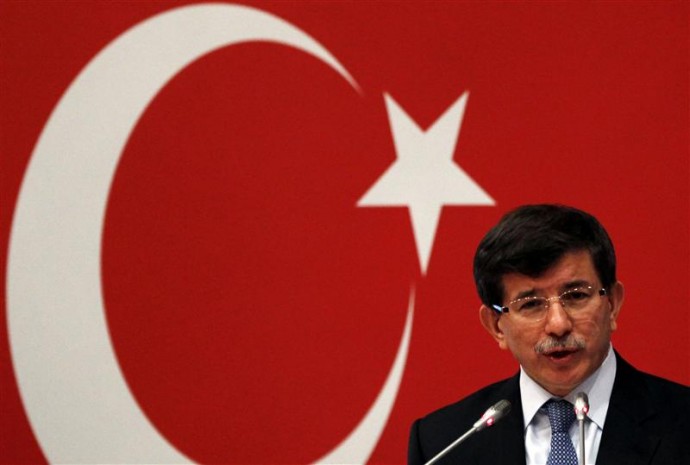Typically Middle East
"[Any military operation to free the town must involve arming regular Syrian rebel groups, not Kurdish militias...] Equip and train the Free Syrian Army so that if [ISIS] leaves, PKK terrorists should not come."
"If they [Americans] don't want to send their ground troops, how can they expect Turkey to send Turkish ground troops with the same risks on our border?"
"[Turkey] did not want to be part of the game for a few weeks or months just to satisfy
American or European public opinion."
Turkish Prime Minister Ahmet Davutoglu

Turkey's Prime Minister Ahmet Davutoglu rejected criticism of Turkey for not intervening to protect Kobani (Reuters)
Well, there's a problem there, no doubt about it. And, as with anything in the Middle East, it's a tangled puzzle of a brain-teaser. To begin with, Turkey has enjoyed amicable relations with the Islamic Republic of Iran. The growing warmth between the two resulted from the government of President Recep Tayyip Erdogan's Islamist Justice and Development Party finding much in common with the fundamentalist Shiite government in Iran.
So, when Syrian President Bashar al-Assad decided the most advantageous position his regime could take in responding to the peaceful demonstrations by the Sunni Syrian majority for a less oppressive slant to the regime's consideration of their equal rights as Syrians by arresting, torturing and killing those unruly critics, Turkey, a Sunni-majority country took offence. Today, Turkey as a member of NATO is enraged that the United States, a NATO colleague, refrains from bombing the regime's military.
And there is a reason for that. That reason being surreptitious accommodation to Iran, which continues to defend and militarily tutor and support Syria in its ongoing bloodbath against Syrian Sunnis, lending the regime its al-Quds Republican Guard special fighting forces, and tasking Lebanon's Hezbollah with supporting the conflict the regime is waging with chemical weapons, barrel bombs and artillery fire against the Sunni Syrians.
Iran is holding out the elusive carrot of allowing the U.S. a modicum of face-saving appearances in its diplomatic and sanctions disagreement with Iran over its nuclear program, and Iran will budge slightly as long as the U.S. promises to withhold its airstrikes from hitting Syrian targets. So while Turkey has refused to help the Kurdish fighters hit back against the Islamic State to keep them from completely overrunning Kobani, it has agreed to train the Free Syrian Army rebels.
So that the Syrian Sunni rebels can control the outcome in Kobani, not the Kurds, even while Ankara has agreed to permit the Iraqi peshmerga to cross in modest numbers into Syria to help their brother Kurds. Any military operation to free the town must involve regular Syrian rebel groups, arming them not the Kurdish militias whose defence of Kobani has thus far kept it within the Kurdish grasp, as far as Turkey is concerned..
The problem has become obvious; even while U.S. and allied air strikes have managed to slow the advance of ISIS, it has not succeeded in loosening its presence in any significant manner. So, Turkey is being urged to send its military on the ground to save Kobani from Islamic State possession. This is, after all, a neighbour, a town whose distance from the Turkish border is measured in mere dozens of kilometres.
Wouldn't it be in Turkey's self-interest not to have ISIS comfortably and militarily ensconced across the border? Even if Turkey did initially (and perhaps still does) support the Islamic State militias? Which also has some popular support within Turkey. But no, since distrust and hatred of the Turkish PKK transcends all other interests, including responsibility toward NATO, which accommodated Ankara by placing anti-missile installations temporarily on the border with Syria.
Turkish troops, Mr. Davutoglu asserted, would be sent into battle only if the West committed their own ground forces to the conflict in Syria, an offer that both Britain and the United States have no interest whatever in. Their own borders are not contiguous with that of any Middle Eastern state, after all. And who needs yet another provocation of Western troops on the ground in a Muslim country? Typically, Middle Eastern countries insist that the West be involved in their local disputes.
Typically, Middle Eastern governments however they're comprised, are reluctant to chastise their own, much preferring the West to become involved. Typically, up until now, they've responded as per expectation. Expansively generous to a fault, however, Mr. Davutoglu hinted that Turkey's Incirlik airbase be open for the use of U.S. jets with the proviso that they also target the forces of the Syrian regime, along with those of ISIS.
In the meanwhile, a 40-vehicle column of Kurdish peshmerga from Iraq with 80 men armed with machine guns and artillery was en route to cross into Turkey, with an additional 72 fighters prepared to fly into Turkey and travel on to Kobani. Even while NATO chafes at Turkey's lack of accommodation at this juncture in the fight against the Islamic State, Turkey returns the compliment, disdainful of Western countries unwilling to invade Syria to solve the crisis there.
A solution that should logically be one addressed by Syria's neighbours.
Labels: Britain, Conflict, Defence, Iraq, Islamic State, Kurds, NATO, Syria, Turkey, United States

<< Home